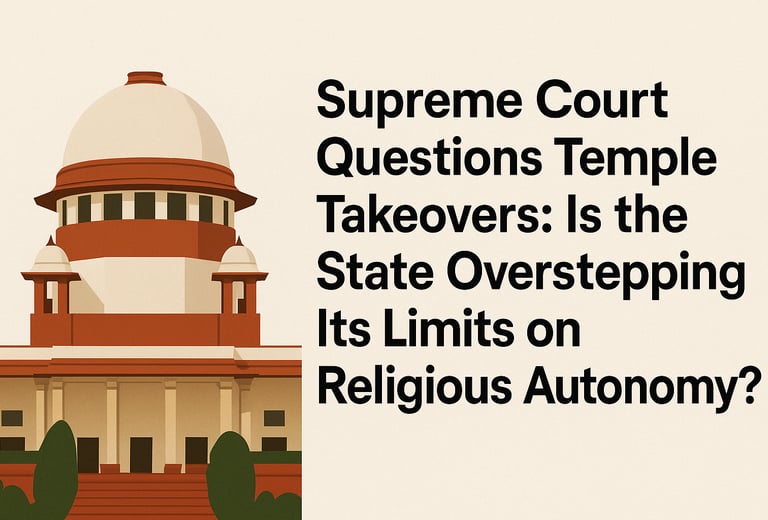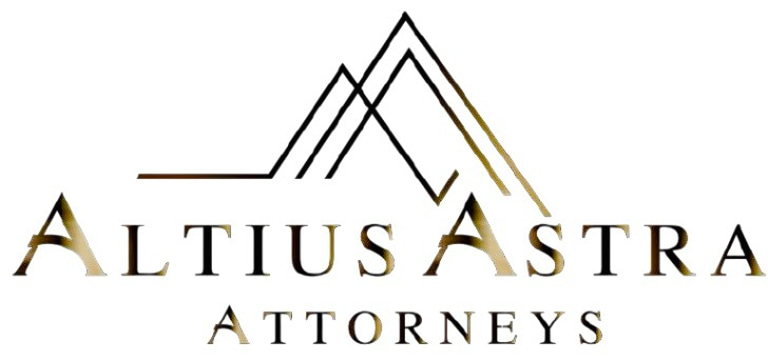Supreme Court Questions Temple Takeovers: Is the State Overstepping Its Limits on Religious Autonomy?
Supreme Court raises alarm on government control of temple trusts across India. Is the UP Banke Bihari Temple Ordinance a violation of religious autonomy and constitutional rights?
Adv Sachin Gupta | Partner | Altius Astra Attorneys
7/28/20253 min read


Introduction
Is your temple truly independent—or is it next in line for a government takeover?
In a compelling turn of events, the Supreme Court of India has thrown the spotlight on a sensitive but growing concern: state encroachment into religious institutions. While hearing a petition challenging the Uttar Pradesh Shri Bankey Bihari Ji Temple Trust Ordinance, 2025, the Court posed a powerful, nationwide question: "How many temple managements have been taken over by legislation across India?"
This question doesn't just pertain to Banke Bihari, it reverberates across every privately managed temple in the country. And it's got constitutional implications that may shake the foundation of religious freedom and property rights in India.
The Crux of the Matter: Banke Bihari Temple Under State Control?
At the heart of the controversy lies the 2025 Ordinance enacted by the Uttar Pradesh Government. On paper, it claims to streamline the temple’s management by vesting administrative responsibilities in a statutory trust called the Shri Banke Bihari Ji Mandir Nyas. The trust is proposed to comprise 11 trustees, including up to 7 ex-officio members—most of whom would be government officials and all required to be Sanatan Dharma followers.
But the petitioners argue this is no routine reorganisation, it's an unconstitutional takeover.
Senior Advocate Kapil Sibal, representing the temple's management committee, called the move malafide, asserting that the Banke Bihari Temple is a private religious institution, not a public temple subject to such government interference.
The Supreme Court wasn’t ready to rubber-stamp the state's actions either.
The Bigger Question: Is This an Isolated Case?
Not quite.
During the hearing, Justice Surya Kant asked a question that echoes the growing anxiety within India’s religious communities:
“How many temples across the country have been taken over by the State via legislation?”
The answer isn’t straightforward—but the implications are chilling.
From Tamil Nadu to Andhra Pradesh, several temples have already been brought under direct state control over the decades, often justified in the name of transparency, better administration, or development projects. However, critics argue that such moves violate Articles 25 and 26 of the Indian Constitution, which guarantee the right to freely manage religious affairs.
And here's the twist: while many of these takeovers involved public temples, the Banke Bihari Temple is a privately managed temple with deep spiritual and historical lineage tracing back to Swami Haridas Ji.
Legal Maze: Between Rights and Redevelopment
Let’s not forget what sparked this Ordinance in the first place, the corridor redevelopment project proposed by the UP Government.
In 2023, the Allahabad High Court approved the project but barred the use of temple funds for construction. However, in May 2025, the Supreme Court modified that order, allowing the State to use Rs. 300 crore for acquiring nearby land—on the condition that the property be registered in the name of the deity.
This judgment, however, is now under challenge.
Devotee Devendra Nath Goswami has filed a recall application, arguing that the temple management wasn't even heard before the Court greenlit such a substantial financial move.
The state's defense? The corridor would benefit lakhs of pilgrims visiting Vrindavan.
But as Sr. Advocate Mr. Sibal pointed out during the hearing: "There’s already an Administrator in place. Why hijack a private dispute with sweeping legislation?"
Constitutional Questions: A Breach of Fundamental Rights?
The petitioners have contended that the 2025 Ordinance is:
Arbitrary and unconstitutional under Article 14 (Right to Equality)
A violation of Article 25 and 26 (Freedom of Religion)
Beyond the powers granted to the Governor under Article 213
An infringement on property rights under Article 300A
Moreover, they argue that the Ordinance was tactically issued mid-litigation to preempt and neutralize ongoing PILs before the High Court.
This raises a critical point: Can the State use legislative power to bypass judicial process in matters of religion?
If this becomes precedent, what's to stop any state from enacting similar laws to control privately managed places of worship?
The Road Ahead—Sacred or State-Owned?
The question posed by the Supreme Court isn’t just rhetorical—it’s a warning bell.
If unchecked, state intervention in religious institutions, especially privately managed ones, could lead to erosion of religious freedoms, dilution of devotee rights, and long-term legal uncertainties.
As the matter continues before the top court, one thing is clear: This case isn't just about Banke Bihari—it’s about the future of faith-based governance in India.
💬 Will this Supreme Court inquiry redefine religious autonomy in India—or are we entering an age of state-controlled spirituality? Tell us what you think in the comments.
Case Citation:
MANAGEMENT COMMITTEE OF THAKUR SHREE BANKEY BIHARI JI MAHARAJ TEMPLE AND ANR. Versus STATE OF UTTAR PRADESH AND ORS., W.P.(C) No. 704/2025
Altius Astra Attorneys
A premier law firm based in Delhi, India, offering legal representation across various practice areas for citizens rights and interests.
© 2025. Altius Astra Attorneys. All rights reserved.
Contact Us
📞 9899290789, 9818786756
📧 contact@altiusastra.com
3C-ED Block, Madhuban Chowk, Pitampura, Delhi-110034
DISCLAIMER
